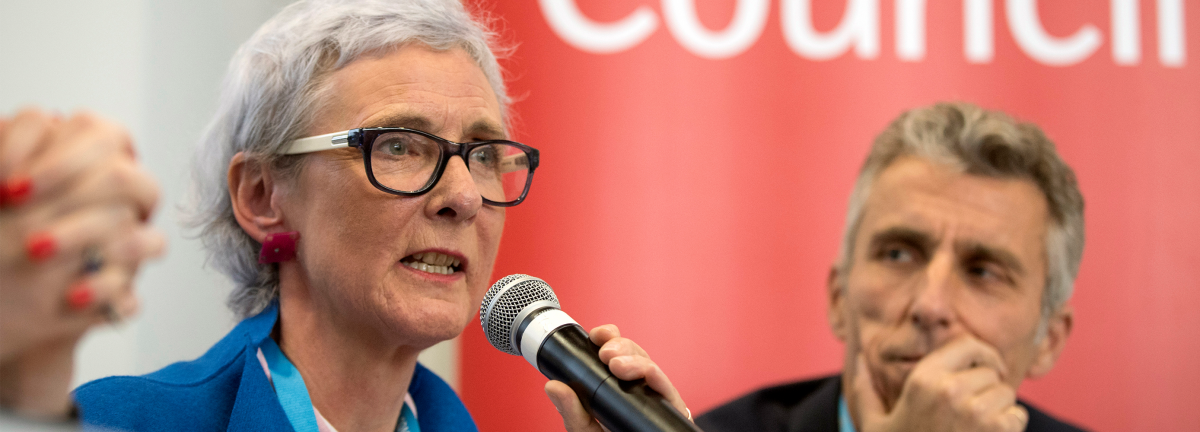Design Council party conference round up 2019

At times over the last two months we couldn’t be sure that the party conference season would even take place. But now it is over, and we can look back on dramas inside the conference halls –contested votes, controversial speeches, and significant policies adopted – and outside, most particularly the Supreme Court ruling on Parliament’s prorogation. Party conferences may sometimes feel like a distraction (and occasionally an irrelevance) but this year that was far from the case.
The UK’s three major UK parties gathered with historic events on the horizon and their responses under the spotlight. As they unfolded, even the weather itself was gripped by change: balmy sunshine in Bournemouth turned to stormy winds in Brighton and finally teeming rain in Manchester. Design Council was there to participate, persuade and pursue the politicians.
Those who expected Brexit to dominate every discussion would have been confounded by the strong sense that many are worn out or bored by it, or simply desperate to talk about other important issues. The relatively few mentions of the B word we heard outside the main auditoria were greeted with barely a flicker of emotion, let alone cheers or jeers, at the fringe events and receptions. Instead we found huge appetite for talking about the practical and the possible, and almost every event Design Council participated in and attended was full to bursting with delegates, observers and exhibitors eager to learn, debate and listen.
Our key themes for this conference season were jobs and skills, regional economies, housing and places. I chaired or spoke at seven fringe meetings, met ministers and their shadows, council leaders, think tankers and business leaders, and Design Council was represented at a further fourteen events, across a total of just six days of attendance: a high rate of productivity!
Despite the evident polarisation of UK politics and, just as an absence of Brexit marked the fringe, much subtle agreement emerged across the key themes we discussed, regardless of which party we were talking with. Everyone is worried about the skills our future workforce might lack as the fourth industrial revolution unfolds. Regional disparities in economic performance and the need for the ‘left-behind towns’ to share in the prosperity that some of our cities have enjoyed are also high on everyone’s agenda. High quality housing and the importance of strong placemaking in our town centres were also the subject of widespread discussion. The hollowing out of our high streets is clearly concerning many.
So what were the areas of most agreement? We heard broad support for devolution of power and resources; welcome recognition of the need for collaboration and co-creation in places and policies; the need for master-planning and greater resourcing for local planning departments; and the need to equip our current and future workforce with those skills we identify as ‘design skills’: problem solving, analytical and critical thinking, and visualisation; and consensus among those we spoke to about the need for a more rounded education to 16, and for increasing access to formal and informal learning through FE, HE and in adult learning settings. One key issue for our future economy, inclusivity, was given greater prominence than it has been before and I was particularly encouraged by the fringe on women and STEM subjects, at which I spoke. Three Conservative women MPs: Transport Minister Nusrat Ghani, Vicky Ford, and Gillian Keegan, spoke passionately and with great insight on the challenges of ensuring young women can thrive in science and engineering. Those contributions, along with the moving speech on domestic violence of Labour’s Rosie Duffield in Parliament last week, amply demonstrated how crucial it has been to increase the representation of women in our politics.
Now the task lies ahead of us to build on contacts made and insights gained and spread the value of design through government, parliament, and at all other levels of public life. Our messages of how design provides answers to complex problems, forming a model of inclusivity through engaging every part of communities at the heart of policy development, how it delivers productive skills and enduring businesses, helps local and regional government to deliver responsive services, can all make headway in a political environment that is, perhaps, not quite as far apart as it usually appears. Of course, with a lasting resolution to Brexit still to be found, the resolve of our leaders isn’t yet fully trained on such important issues. Our focus is on making sure that now and in the unknowable future the value of design is recognised and exploited to the maximum.
Subscribe to our newsletter
Want to keep up with the latest from the Design Council?
